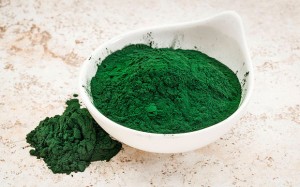Scientists in China tested the therapeutic potential of polypeptides present in spirulina proteins on different types of cancer, and found significant positive effects on mesothelioma. The study, “Inhibitory effects of small molecular peptides from Spirulina (Arthrospira) platensis on cancer cell growth,” was published in the journal Food & Function.
Spirulina is a cyanobacterium (Arthrospira, a blue-green algae) that can be consumed by humans and other animals. Arthrospira is cultivated worldwide and comprises two species, Arthrospira platensis and Arthrospira maxima. It is used as a dietary supplement as well as a whole food, being available in tablet, flake, and powder form. Spirulina is also used as a feed supplement in aquaculture, aquarium and poultry industries.
Drs. Zhujun Wang and Xuewu Zhang from the South China University of Technology in Guangzhou studied spirulina in more detail and isolated its polypeptides. The team discovered 15 peptides — including a new one — that were capable of decelerating the growth of lung cancer cells.
“These polypeptides exhibited anti-proliferation activities on cancer cells, and low toxicity or stimulatory activity on normal cells, suggesting they are promising ingredients in food and pharmaceutical applications,” the authors said in a news release.
Although the research team did not test the effects of spirulina directly in mesothelioma cells, pleural mesothelioma is a lung-related cancer that shares many of the same features as lung cancer. Mesothelioma is a rare form of cancer that develops from cells of the mesothelium, the protective lining that covers many of the internal organs of the body. The most common anatomical site for mesothelioma development is the pleura, the outer lining of the lungs.
Mesothelioma is fairly rare in the United States, with about 3,000 new cases being diagnosed each year, and has a poor survival rate.
“Because mesothelioma is such an aggressive and lethal cancer, we pay close attention to news of anything that may be able to slow its growth, especially without causing significant side effects,” said Alex Strauss, managing editor of Surviving Mesothelioma.
According to the researchers, the results from the study suggest that the peptides found in spirulina may be promising ingredients in food, nutraceutical and pharmaceutical applications.


